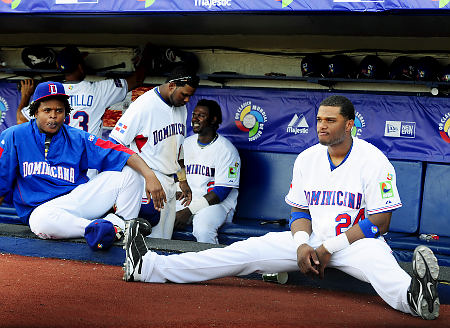
ON THE RISE
The following season, Robinson was promoted to the Staten Island Yankees. It was just a 22-game stop on the way to Class-A Greensboro, where he hit .276 and led the Bats in hits, RBIs, total bases and triples. Robinson was named the South Atlantic League’s All-Star shortstop.
The 20-year-old opened the 2003 campaign with a 5-for-5 day and went 11 games before being held hitless. The Yankees had converted him to a full-time second baseman, and he showed no ill effects from the position switch. Robinson played 90 games for the Tampa Yankees, batting .276 again, with 50 RBIs. He finished the season with the Trenton Thunder, where he hit .280 against Eastern League pitching.
Robinson split the 2004 campaign between Trenton and Class-AAA Columbus. He batted a combined .283 with 29 doubles, 10 triples, 13 homers, and 74 RBIs. Robinson was killing the ball for the Thunderwhen he was promoted at the end of June. He made his debut with the Clippers a memorable one with a 4-for-4 day.
The Yankees could not have been more pleased with their second baseman’s progress. The team had traded away Alfonso Soriano, plugging the hole with veterans Miguel Cairo and Enrique Wilson. New York, however, believed the position would eventually be Robinson's. He needed to become a bit more selective at the plate, but other than that he looked to be major league ready. Already there were whispers around baseball that the Yankees had an All-Star in the making. Robinson’s name came up in trade talks all summer, but the Yankees resisted. After letting players of his caliber go in the past, they were determined to hang on to him.
Robinson did everything he had to in spring training of 2005 —including making a positive impression on Derek Jeter—but the Yankees decided to start him off in Columbus, where he could get regular at-bats. He murdered the ball over the first month, batting .333 and slugging .574.
Meanwhile, in New York, a shakeup was underway. Bernie Williams—Robinson’s hero—was no longer getting it done in center field, and Joe Torre decided to shift Hideki Matsui over from left and replace him with Tony Womack, who had been signed over the winter to play second. With Womack in the outfield, the Yankees turned to Robinson as Jeter's keystone mate.

The rookie struggled when he hit the big leagues, enduring an 0-for-18 slump that would have torpedoed most young players. But Robinson was a different kind of rookie. When pressed by reporters to explain his slump, he replied that he was not worried—he was seeing the ball well and swinging well. The hits simply weren't dropping.
Luis Sojo, the coach assigned to be Robinson’s mentor, saw soon enough that there was little he could teach the kid. Robinson's father had done a good job. Torre was amazed at the youngster's swing and began comparing him to Rod Carew, even when “Robby” was hovering around the Mendoza line.
By the end of May, Robinson‘s struggles were all but forgotten. He had solidified second base for the Yankees, presumably for many years to come. Criticized on occasion for losing his focus in the field, he proved to be sure-handed and level-headed enough to earn starts every day.
Among the highlights from his first season were back-to-back five-RBI games and the longest road hitting streak in the majors since 2003. Robinson got better as the year wore on. He at hisbest in September, winning Player of the Week honors in the middle of the month. He was also named Rookie of the Month honors after batting .381.
Robinson finished the '05 campaign at .297 with 14 home runs and 62 RBIs in 132 games. His average was tops among American League rookies, as were his 78 runs scored,155 hits and 34 doubles.
The Yankees made the playoffs but lost to the Anaheim Angels in the ALDS. Robinson laced a bases-clearing double off Cy Young Award winner Bartolo Colon in his first postseason at-bat and collected four more hits in the series for a .263 average.
Early in the 2006 season, Torre surprised reporters when he began saying that Robinson had the kind of swing that would produce a batting title one day. But not even the New York skipper suspected that, by season’s end, Robinson would come within a few hits of proving him right.
The Yankees have had many great players, but only Joe DiMaggio and Don Mattingly had batted over .340 in their second season. Robinson joined them in ’06 by hitting .342. He added 41 doubles, 15 homers and 78 RBIs despite missing the entire month of July with a pulled hamstring. The hammy cost him a slot on the All-Star roster, but he came back strong and helped the Yankees finish in first place in the AL East.
One of the year’s highlights came late in September, when Baltimore’s Daniel Cabrera took a no-hitter into the ninth inning against the Yankees. After retiring the first hitter, Cabrera stared in at Robinson. The two had grown up together in San Pedro. They lived a minute or two away from each other and hung out during the winters. Robinson lined a single to left to break up the no-no. After the game, Cabrera joked that “he’not my friend no more."
Once again, Robinson finished his season with a flair, batting .365 down the stretch. Carrying a 13-game hitting streak into the playoffs, he finished third behind Joe Mauer and Jeter in the batting race, with just five points separating the trio.
Again, the New York bats fell quiet in the ALDS, this time against the Detroit Tigers. Robinson was one of the culprits. He managed a meager two hits in his team’s four-game loss. After the series, the Yankees let Torre know that his services were no longer desired. He left for the West Coast and was replaced by Joe Girardi, the former New York catcher.
The change at the top did not immediately change the sagging fortunes of the Bronx Bombers. They began the 2008 season sluggishly and never recovered. The Tampa Bay Rays and Boston Red Sox finished ahead of them and made the playoffs. Watching the postseason from hom didn’t sit well with anyone in the New York organization.
Robinson was one of the reasons the Yanks struggled. He labored to get his average over .200 in the early weeks of the season and finished at a lackluster .271, with 14 homers and 72 RBIs. Robinson heard it from fans and the media. At one point, he was labeled as “lazy.” Nothing upset him more. He knew that shaking that kind of reputation would be difficult.
